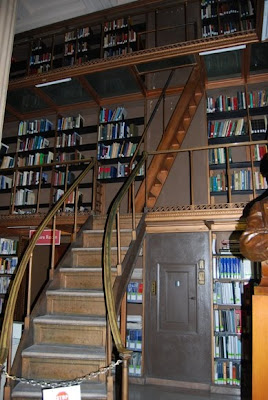
A couple weeks back, we made a silly mistake. I had thought we were signed up for one of the student performances at the Ordway. We drove to St. Paul and I was really stressed. We parked at the Science Museum lot and walked the half a block to the theater and arrived at what we thought was two minutes late. Discovering the theater was locked, I fumbled through my bag and looked at my datebook and discovered I was a week early. Oops. However, it turned out to be a great mistake. The St. Paul Public Library's Central Library borders the small park downtown and is in the vicinity of the Landmark Center and the Ordway, yet I have never taken my children there. I haven’t been in there for years.

We decided to go in just to look around. Adjacent to the Central Library, is the James J Hill Reference Library. Though built on separate foundations and are separate buildings, the two appear to be one seamless structure. They are both stunning from the outside, but when you go in you feel transported back to an earlier and much grander time in architecture. The woodwork, the doors, the lighting fixtures are magnificent--and yet each has their own feel. The stones in the Public library side are worn gently from the hundreds of thousands of people that have visited over the years. A person can still definitely see and feel the historic significance—as beautiful as the library is, it is also important to take consider the impact the namesake had.

Hill was a shrewd businessman who made millions from the railroad. He made millions by hard work and perceptive decisions. He did not come from money—his story typifies the Horatio Alger stories and others from the late nineteenth century. However, rags to riches stories are fairy tales that rarely come true. For Hill, opportunities did present themselves and he made the right choices. However, like Rockefeller and Carnegie—he also used manipulation and bullying to help make his fortune even bigger. At one point when the economy was doing poorly, he forced his employees into taking lower wages despite being very solvent. He was known for coercing towns into giving him the absolute best property in town for his rail line with the threat of bypassing it. "Business" is fine, but there should also be a sense of fair play that just usually isn't present and never really has been. Though labor relations soured enough to force him to put him employees on the pre-crisis wages, his arrogance and disregard is shown in how little he cared for the people doing the work that made him such a wealthy man in the first place. So, visit this fine institution and enjoy it. But please also understand that Hill’s generosity came at a cost to the people who worked hardest for him. Wealthy men are noted by the buildings they leave and not the exploitation of the most vulnerable in their lifetimes.
No comments:
Post a Comment